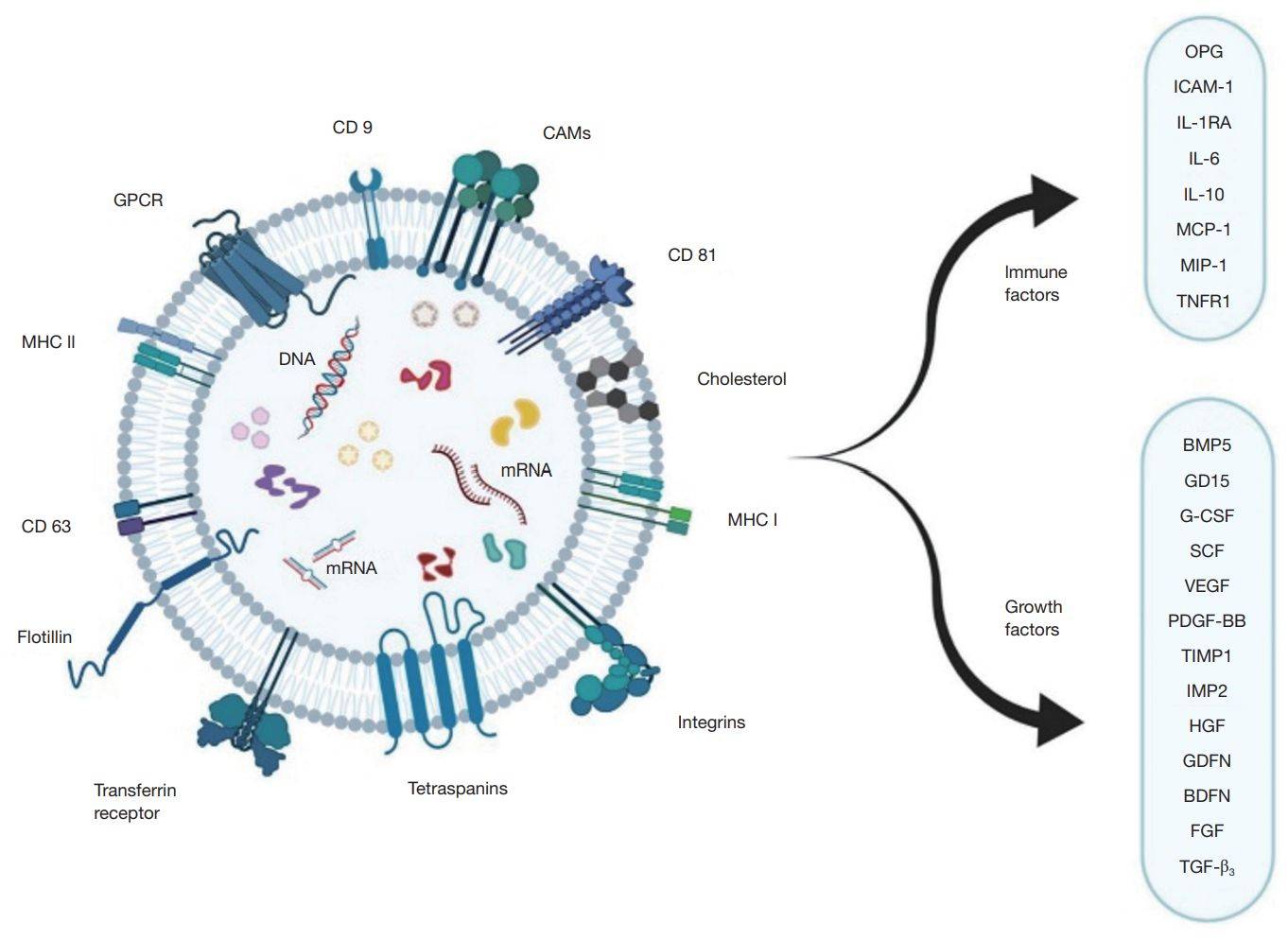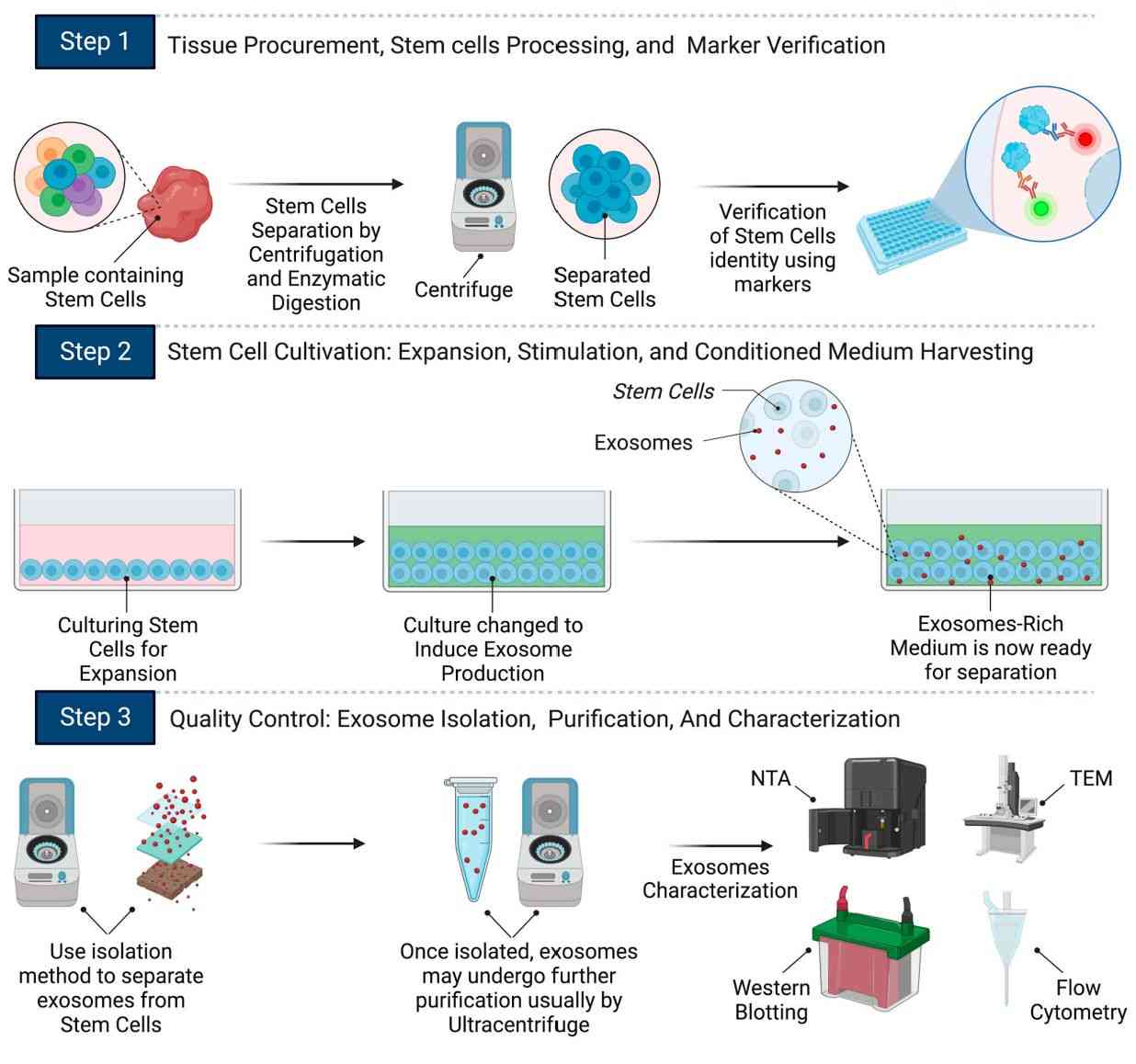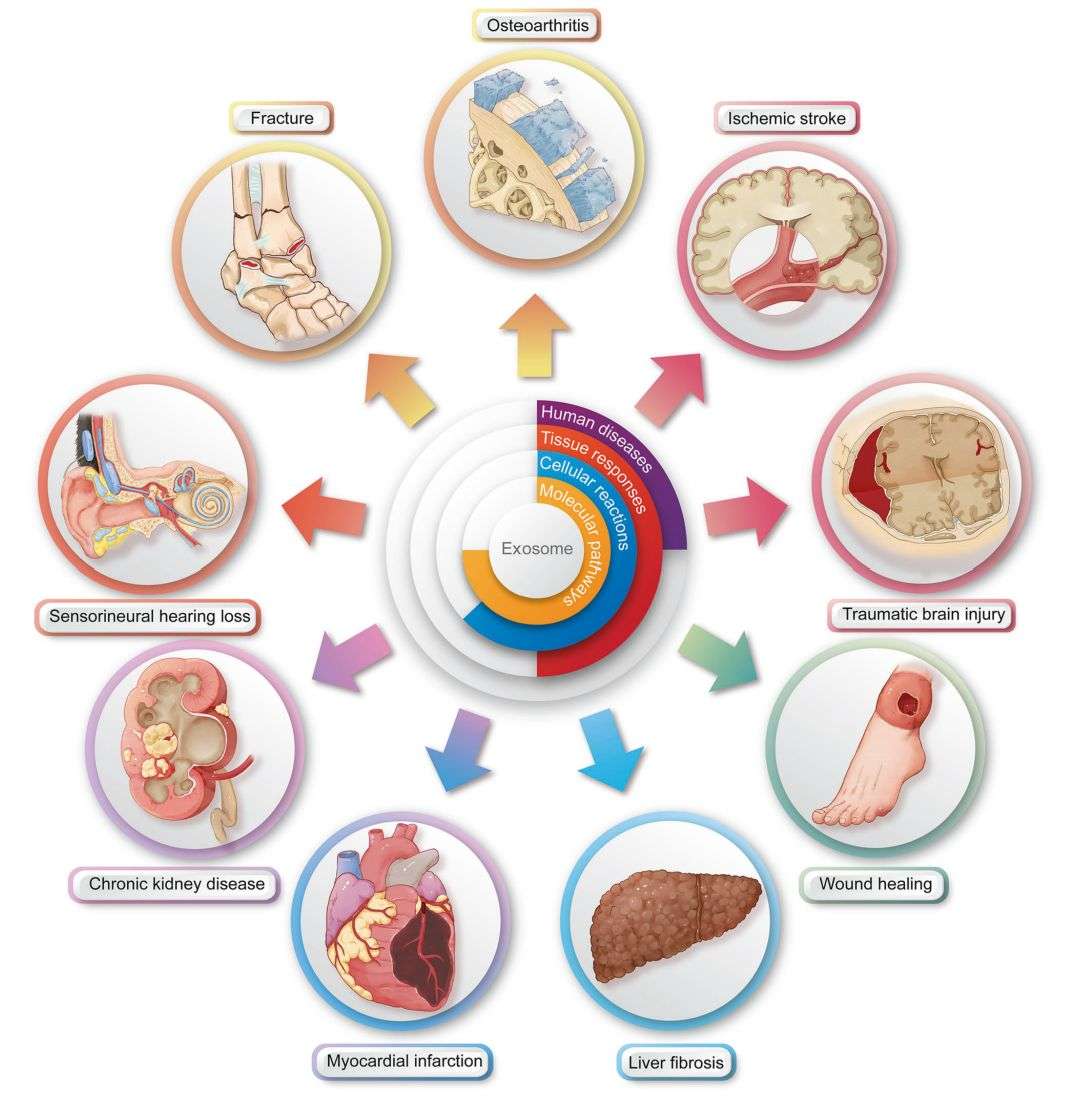What is Exosome Therapy?
Stem cell therapy is a rapidly growing field of regenerative medicine that primarily involves using adult stem cells (usually from the umbilical cord, bone marrow, or adipose) to repair damaged or diseased tissues. In recent years, stem cell therapy has added a new dimension with the discovery of cell-derived exosomes. These extracellular vesicles are secreted by virtually all human cells, including stem and specialized cells. They carry a variety of biological materials, such as proteins, lipids, and nucleic acids, from donor to recipient cells.
In clinical trials, stem cell-derived exosomes have shown promise in treating chronic diseases. Their ability to deliver growth factors and regenerative substances directly to damaged tissues may revolutionize current treatments. However, much remains to be learned about the biology and therapeutic potential of exosomes, and further research is needed to fully realize their potential for stem cell therapy.
Overview of Exosome Therapy
To understand exosome therapy, you must first understand exosomes. Exosomes are thought to play a crucial role in cell biology, especially in intercellular communication. They can transport cargo to target cells, affecting their function and behavior. This property has generated interest in the potential use of exosomes in medical therapies, both as therapeutic agents themselves and as drug delivery vehicles.
 Figure 1. The basic structure of mesenchymal stem cell exosomes. (Muthu S, et al., 2021)
Figure 1. The basic structure of mesenchymal stem cell exosomes. (Muthu S, et al., 2021)
Exosomes can exert therapeutic effects through a variety of mechanisms, including:
- Paracrine Signaling - exosomes can deliver signaling molecules that stimulate the proliferation, migration, and differentiation of target cells.
- Immunomodulation - Exosomes can modulate the immune response, reduce inflammation, and promote an anti-inflammatory environment.
- Angiogenesis - Exosomes can stimulate the formation of new blood vessels and improve nutrient and oxygen delivery to damaged tissues.
- Anti-apoptosis - Exosomes can inhibit programmed cell death and help maintain cell viability in damaged tissues.
Exosome therapy, an emerging field of regenerative medicine, is a therapeutic approach that utilizes the biological functions of exosomes. Exosomes can be derived from a variety of cell types, such as mesenchymal stem cells (MSCs), dendritic cells, and tumor cells, each with unique therapeutic properties. Promising preclinical and clinical findings in exosome therapy highlight its potential as a novel and versatile treatment for a wide range of medical conditions.
Production, Isolation, and Purification of Exosomes
Heterogeneity in size, surface markers, contents, and origin makes the isolation of exosomes difficult. Currently, available techniques for exosome isolation and purification are based on their size, surface charge, or immunoaffinity. For example, ultracentrifugation is considered the gold standard for exosome extraction. Immunoaffinity chromatography is a separation technique based on the specific binding of antibodies and ligands. Size-based separation techniques mainly refer to ultrafiltration and size exclusion chromatography and are suitable for large-scale applications. Combining the above techniques with others (e.g., precipitation-based and microfluidic-based techniques) may be the solution to simultaneously meet the multiple requirements for exosome separation and purification.
 Figure 2. Comprehensive flow chart for stem cell exosome production. (Abdulmalek OAAY, et al., 2024)
Figure 2. Comprehensive flow chart for stem cell exosome production. (Abdulmalek OAAY, et al., 2024)
Application Areas of Exosome Therapy
Stem cell exosomes have a variety of therapeutic effects that are transformed through a cascade of tissue-specific responses and cell-specific molecular signaling pathways.
 Figure 3. Illustration of downstream surgical applications of exosome therapy. (Tan F, et al., 2024)
Figure 3. Illustration of downstream surgical applications of exosome therapy. (Tan F, et al., 2024)
Regenerative Medicine
- Wound Healing - Exosomes can promote skin cell proliferation and migration, enhance angiogenesis, modulate inflammatory responses, and accelerate wound closure and tissue repair.
- Bone and Cartilage Repair - Exosomes can stimulate the differentiation of stem cells into osteoblasts and chondrocytes, promoting bone and cartilage regeneration.
- Organ and Tissue Regeneration - Exosomes can support the repair and recovery of damaged organs (e.g., heart, liver, and kidney) by activating endogenous repair mechanisms.
Neurological Disorders
- Stroke - Exosomes protect neurons from ischemic damage, promote neurogenesis, and enhance functional recovery after stroke.
- Neurodegenerative Diseases - Exosomes transport neuroprotective factors and modulate immune responses, potentially slowing the progression of diseases such as Alzheimer's disease, Parkinson's disease, and amyotrophic lateral sclerosis (ALS).
- Spinal Cord Injury - Exosomes may stimulate axonal regeneration, improve neuronal function, reduce inflammation, and aid in the recovery of spinal cord injuries.
Cardiovascular Disease
- Myocardial Infarction - Exosomes can enhance angiogenesis, reduce cardiomyocyte apoptosis, and improve cardiac function after a heart attack.
- Ischemic Heart Disease - Exosomes can promote the formation of new blood vessels, enhance cardiac cell survival, and reduce the effects of ischemia.
Immune-related Diseases
- Autoimmune Diseases - Exosomes modulate the immune response, suppressing an overactive immune system and restoring immune homeostasis in diseases such as rheumatoid arthritis, multiple sclerosis, and systemic lupus erythematosus.
- Inflammatory Diseases - Exosomes help control inflammation by reducing the production of inflammatory cytokines and promoting an anti-inflammatory phenotype in immune cells.
Other Applications
- Diabetes - Exosomes enhance insulin secretion, improve glucose homeostasis, and promote pancreatic β-cell regeneration.
- Dermatology - Exosomes can promote skin cell proliferation, enhance wound healing, and mitigate the effects of skin aging and UV damage.
- Cancer - Exosomes can be used to deliver therapeutic agents, such as anticancer drugs or immunostimulatory molecules, to target tumor cells and modulate the tumor microenvironment.
Our Products
As a leading supplier of exosomes, Creative Biostructure is at the forefront of the exosome therapeutic revolution. We are committed to providing our clients with the highest quality stem cell exosome products to facilitate research and development efforts in a variety of medical applications. Our proprietary isolation and characterization technologies ensure the purity, potency, and consistency of exosome products.
From wound healing and tissue repair to immunomodulatory and neurological applications, our products have demonstrated exceptional versatility in preclinical studies. Feel free to contact us for more information.
| Cat No. | Product Name | Source |
| Exo-SC02-1 | HQExo™ Exosome-PCS-500-012 | Exosome derived from human bone marrow-derived mesenchymal stem cell line (PCS-500-012) |
| Exo-SC02-2 | HQExo™ Exosome-Pla-MSC | Exosome derived from human placental derived mesenchymal stem cell |
| Exo-SC01 | HQExo™ Exosome-PCS-500-011 | Exosome derived from human pre-adipose derived mesenchymal stem cell (PCS-500-011) |
| Exo-SC03 | HQExo™ Exosome-hTERT | Exosome derived from hTERT-immortalized Mesenchymal Stem Cell |
| Exo-SC04 | HQExo™ Exosome-MSC | Exosome derived from Xeno-Free Human Mesenchymal Stem/Stromal Cells and Media |
| Exo-C02 | CosExo™ Exosome-hMSC | Exosome derived from Human Umbilical Cord Mesenchymal Stem Cell |
| Explore All Exosome Isolated from Stem Cell Lines | ||
References
- Muthu S, et al. Exosomal therapy-a new frontier in regenerative medicine. Stem Cell Investig. 2021. 8:7.
- Abdulmalek OAAY, et al. Therapeutic Applications of Stem Cell-Derived Exosomes. International Journal of Molecular Sciences. 2024. 25(6): 3562.
- Tan F, et al. Clinical applications of stem cell-derived exosomes. Signal Transduct Target Ther. 2024. 9(1): 17.